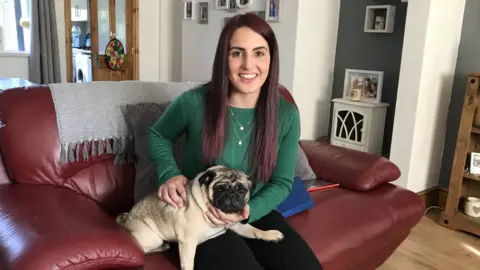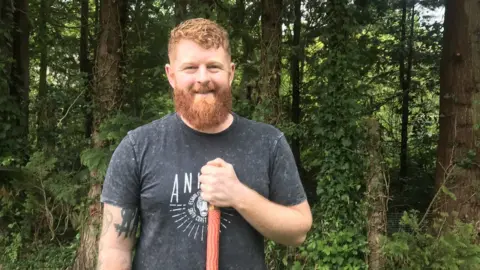Stroke Awareness Month: The young people affected
 BBC
BBCWhen Lauren Watson woke up in hospital aged 25, the only word she could say was "yeah", even if she meant no.
Ms Watson, now 28, explained that she could think what she wanted to say but "couldn't speak it".
She had suffered a stroke and undergone keyhole surgery to remove the clot in her brain.
The teaching assistant from Hengoed, Caerphilly, could not walk for days, and was unable to move her right arm properly.
May is Stroke Awareness Month, and Ms Watson wants young people to know that it can happen to anyone.
She said: "It took me having a stroke for me to realise that you need to phone the doctor."
Ms Watson felt ill with a headache before she was hospitalised in December 2015, and had suffered an aching knee - but thought it was not serious.
Her boyfriend at the time noticed her speech had become strange and insisted she went to her parents' home, but took her to the hospital after she fainted and vomited.
Being unable to say anything other than "yeah" was terrifying, and Ms Watson said: "I knew what I wanted to say but couldn't say it.
"I thought, 'I'm better off not being here.'"
Initially, it was thought Ms Watson's stroke was caused by a heart problem, but after tests could not detect an issue, doctors now believe it was stress-induced.
Ms Watson had been physically fit, often going to the gym twice a day, and did not consider herself particularly stressed.
"I didn't want to fall asleep because I thought it would happen again," she said.
"I still think 'why me?'"
She added that she "didn't know stress could trigger so many things".
"Stroke can happen to anyone, at any age and any fitness."
 Lauren Watson
Lauren Watson
Carol Bott, Stroke Association's Wales director, said there is an increase in working age people suffering strokes, which could in part be down to increased detection.
But Ms Bott said there "is no definitive answer" as to why this is happening.
She added that the charity is "trying to dispel the myth that a stroke only happens to the older population."
Research also found that a large proportion of 35 to 44-year-olds who suffer ischaemic strokes have high blood pressure.
This may be due to genetics but stressful or unhealthy lifestyles could play a part.
The Welsh Government said its stroke delivery plan 2017-20 sets out their approach in providing stroke education and raising public awareness.
It added that Health Minister Vaughan Gething is due to meet with the Stroke Association shortly to share ideas about what further work could be undertaken in this area.

Meanwhile Dave Jones had no idea he was having a stroke aged 36.
As he left home in Ammanford in 2017 for a job interview, his wife Susan had commented on his slurred speech.
But he went anyway, and was offered the job on the spot, before going out to dinner with friends to celebrate.
The father-of-two had been unable to swallow his dessert, and left early to go to bed.
When he woke the following morning, he could not see.
Mood swings
Mr Jones had suffered a brainstem bleed, and although he regained his sight, almost two years later he still struggles with speech, memory, movement and emotions.

"There's a stigma of being a man, and a big bloke that I am, that we shouldn't cry. It just happens," he said.
"I can be in town, I can be sitting in the house… I'll just fill up and start to cry.
"Five minutes later I'm hysterically laughing."
Having a stroke often changes how someone speaks, but now Mr Jones visualises his words differently.
He said: "I now see my conversation words come down in front of my eyes, and some of the time, the word will just shoot left."
Mr Jones added he has to "call the word back".
"It's hard to explain, but that's how my conversations go. It's frustrating, and it sort of reminds me that I've had a stroke."
His wife Susan, who said she is "extremely proud" of her husband, said sometimes he would say something "inappropriate or muddled up", and then not understand why someone was offended - affecting his confidence.
"I would watch people look at him and some would actually ask if he had been drinking," she added.
Unable to cook alone
Mr Jones, who loves motorbikes, fishing and off-roading, recently put his Harley Davidson up for sale because he could not remember how to put it in gear.
He has to map his way downstairs in the morning, in a house that he has lived in for three years.
He said: "When I first had a stroke, I nearly burned the house down trying to cook an egg.
"I heard something on TV... I sat on the sofa watching TV for less than ten minutes and I could smell smoke and see flames on the cooker.
"I had to be supervised to boil an egg in the beginning."
Despite his setbacks, Mr Jones said he is still healing, and describes himself as stubborn and determined.
"I'm not the old person, but I will rebuild to a new me."
